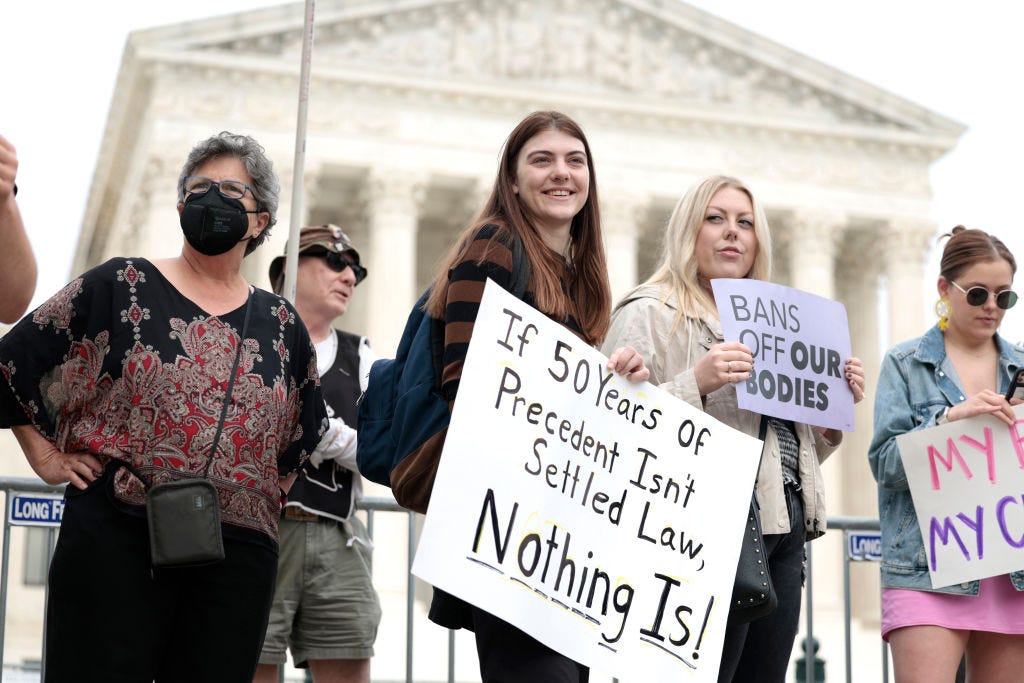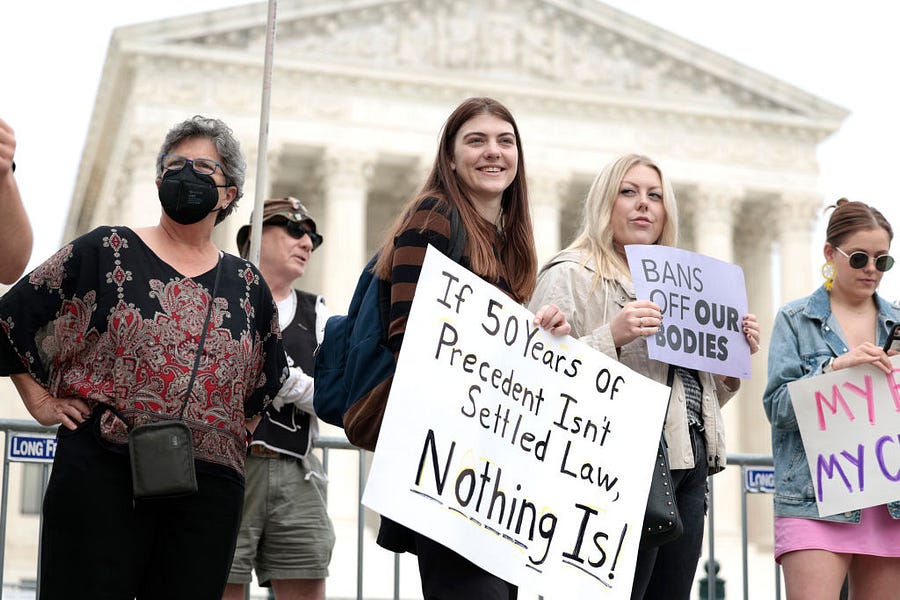Happy Friday! The stock market had its worst day in nearly two years yesterday, one day after it had its best day in nearly two years. We’re not financial advisers, but unless you’re very close to retirement, we recommend just not checking your portfolio for a while.
Quick Hits: Today’s Top Stories
-
After formally recommending Moderna or Pfizer’s COVID-19 vaccine back in December, the Food and Drug Administration announced Thursday that—following a review of the risk of life-threatening blood clots—it will limit the authorized use of Johnson & Johnson’s shot to only people who can’t or won’t take other vaccines. The agency said it had confirmed 60 cases of thrombosis with thrombocytopenia syndrome (TTS)—including nine deaths—among millions who took the shot.
-
After a Wednesday New York Times piece reported that—according to anonymous U.S. officials—American intelligence has helped Ukraine’s military target and kill Russian generals, Pentagon press secretary John Kirby on Thursday said the U.S. isn’t doing so on purpose. “We do not provide intelligence on the location of senior military leaders on the battlefield or participate in the targeting decisions of the Ukrainian military,” Kirby said. Thursday evening, NBC News reported U.S. intelligence helped sink the Moskva, a key Russian battleship, according to anonymous U.S. officials.
-
OPEC announced Thursday it would increase its oil output by only 432,000 barrels per day in June, ignoring Western pleas to accelerate production and ease price pressure amid sanctions on Russian energy. OPEC is still following its plan to undo the production drops it implemented in 2020 when COVID-19 lockdowns curbed demand.
-
Two men killed three people and wounded several others at a park in an Israeli city on Thursday, the country’s independence day. Palestinian terrorist groups praised the attack but none took responsibility. Palestinians had clashed with Israeli police at the Temple Mount, or al-Aqsa Mosque complex, earlier Thursday. The area had reopened to Jewish visitors after a closure during Ramadan, and Yahya Sinwar, a Hamas leader, last Saturday warned of consequences if Israelis visited and urged West Bank Palestinians to attack Israelis.
-
The average number of daily confirmed COVID-19 cases in the United States has continued to increase, up 42 percent over the past two weeks but still lower than it’s been throughout most of the pandemic. The average number of daily deaths attributed to COVID-19, however, continue to fall, down 21 percent over the same time period.
-
The Labor Department reported Thursday that initial jobless claims—a proxy for layoffs—increased by 19,000 week-over-week to 200,000 last week. Jobless claims have been hovering near record lows in recent weeks, and this increase was the first since the first week of April.
Could Other SCOTUS Rulings Fall If Roe Falls?

Justice Samuel Alito’s leaked majority opinion in Dobbs v. Jackson Women’s Health Organization—published by Politico on Monday—is more than 60 pages long (excluding appendices), but nine words stand out above the rest.
“We hold that Roe and Casey must be overruled.”
The ruling will not be final until it’s formally issued later this summer, and the justices could very well make—or already have made—changes to the draft opinion Alito circulated in early February. But if the document ultimately issued contains those nine words in that order, the implications will be massive. With just a few keystrokes, Alito will have rewarded decades of work by millions of pro-life activists—and enraged millions more who feel a fundamental right is being taken away.
But perhaps of equal importance to the opinion’s thesis statement are the next two sentences justifying it. “The Constitution makes no reference to abortion, and no such right is implicitly protected by any constitutional provision, including the one on which the defenders of Roe and Casey now chiefly rely—the Due Process Clause of the Fourteenth Amendment,” Alito writes. “That provision has been held to guarantee some rights that are not mentioned in the Constitution, but any such right must be ‘deeply rooted in this Nation’s history and tradition’ and ‘implicit in the concept of ordered liberty.’”
For reasons Jonah outlines well in Wednesday’s G-File (🔒), many prominent critics of Alito’s opinion have in recent days focused more of their fire on the ruling’s underlying logic than the outcome of the ruling itself. “It concerns me a great deal that we’re going to, after 50 years, decide a woman does not have a right to choose,” President Joe Biden told reporters on Tuesday. “But even more equally as profound is the rationale used. … If the rationale of the decision as released were to be sustained, a whole range of rights are in question.”
Similar arguments have been put forward by Speaker Nancy Pelosi and Vice President Kamala Harris, by legal scholars and progressive activists, in Vox and in Vice. By striking down Roe and Casey on the grounds that a right to an abortion is neither “implicitly protected by any constitutional provision” nor “deeply rooted in this Nation’s history and tradition,” their reasoning goes, Alito is cracking open the door for the Supreme Court to revisit other decisions that established rights using a similar rationale. Griswold v. Connecticut. Lawrence v. Texas. Obergefell v. Hodges. The right to buy and use contraceptives, the right to certain forms of consensual sexual intercourse, the right to marry someone of the same gender.
Jim Obergefell himself—the lead plaintiff in that 2015 case—told Vice this week he’s “terrified” of what overturning Roe would mean for LGBT rights and other protections.
Is there anything to his concerns? Well, yes … and no.
Those rights—like the right to have an abortion—are “unenumerated,” meaning they are not explicitly codified in the Constitution but instead inferred by other rights that are. And in establishing all four of them over the past 60 or so years, the Supreme Court relied on both the Due Process Clause of the 14th Amendment and a “right to privacy” that the justices read into the Constitution from the “penumbras”—or shadowy edges—of existing rights. But in overturning Roe, Alito’s draft opinion argues that justification for an unenumerated right to abortion is insufficient, as such a right was not “deeply rooted” in American history and tradition. Neither were the rights to contraception, sodomy, or same-sex marriage. So strictly speaking, because their underlying rationale is mostly the same, the fate of all four should be tethered together. If one falls, the others would theoretically crumble as well.
“I’m having trouble placing the right to birth control, sodomy, gay marriage [in American history and tradition],” Sarah said on yesterday’s Advisory Opinions. “Why is Obergefell safe after this Dobbs opinion?”
“Philosophically,” David replied, “it is not.”
But all that being said, there are a number of reasons to believe an overturning of Roe will not lead to reversals of Griswold, Lawrence, or Obergefell. For starters, Alito specifically says so himself. “To ensure that our decision is not misunderstood or mischaracterized, we emphasize that our decision concerns the constitutional right to abortion and no other right,” he writes in response to Solicitor General Elizabeth Prelogar’s concerns about those three cases, arguing abortion is “unique” because it “terminates” life or potential life. “Nothing in this opinion should be understood to cast doubt on precedents that do not concern abortion.”
Alito, of course, dissented in Obergefell, arguing, like he does in Dobbs, that “the Constitution says nothing about a right to same-sex marriage.” He also joined a concurrence with Justice Clarence Thomas in Davis v. Ermold, in October 2020, alleging Obergefell relied on a “cavalier treatment of religion.” So why would he proactively take revisiting it off the table? Because he’s not just writing for himself.
“I don’t think [Alito] gets five votes for an opinion that threatens Obergefell,” David said on yesterday’s podcast. In his 2017 confirmation hearing, now-Justice Neil Gorsuch reminded senators the Supreme Court had held that “single-sex marriage is protected by the Constitution,” and in 2020 he authored an opinion reinforcing workplace discrimination protections for gay and transgender people. Justice Brett Kavanaugh, in Dobbs oral arguments last December, listed Obergefell as one of the most “consequential and important” cases in Supreme Court history.
But there’s also a much simpler reason Obergefell, Griswold, and Lawrence are unlikely to meet a similar fate as Roe: Nobody really wants them to. “Every year for 50 years, there’s been a march on Washington to overrule Roe,” said Josh Blackman, a constitutional law professor at South Texas College of Law Houston. “There’s no march on Washington to reverse gay marriage. There’s no march on Washington to ban birth control. There’s no march on Washington to reinstitute interracial marriage bans. There’s no appetite for this.”
Blackman’s certainly correct that there’s no mass desire to overturn those precedents, but if the Supreme Court’s final Dobbs opinion looks anything like Alito’s draft, it’ll likely spur some conservative activists or ambitious politicians to try their luck with a challenge to Obergefell or Griswold. But thanks to the stare decisis principle—under which the Supreme Court generally adheres to its previous decisions—there’s a very high bar to overturn precedent.
“One of the factors they consider is, has this rule proved workable. The Roe standard has not proved workable, the Casey standard has not proved workable,” Blackman said. “The gay marriage standard is working just fine. No one challenges it, no one disputes it. The fact that people have [access to] birth control, no one’s disputing it. Banning interracial marriage, there’s no debate. It’s completely functional. It doesn’t get litigated. It’s simple.”
“Does the reasoning in the Dobbs draft opinion undermine birth control and gay marriage? Yeah, it does,” he continued. “But in terms of stare decisis, there’s not any sort of evidence this is unworkable. Just because something’s wrong doesn’t mean you overrule it. There’s an entire analysis you go through. I think under those other factors, you don’t overrule those other decisions.”
David Perdue Sputters in Georgia
With Ohio’s chaotic U.S. Senate primary in the rearview, Pennsylvania (May 17) and Georgia (May 24) are the next major opportunities Republican voters have to shape the direction of the party ahead of the 2022 midterms. Donald Trump scored a notch in his belt with J.D. Vance’s victory earlier this week—will he do the same with Dr. Mehmet Oz and former Sen. David Perdue?
Andrew spent some time in Georgia this week, and found a Perdue campaign hyper-focused on relitigating the 2020 election—and running on fumes.
During the runoffs of late 2020 and early 2021, Perdue’s tepid treatment of Trump’s stolen-election claims rubbed some Trump-happy state Republicans the wrong way.
Now, he’s all in, and the voters who show up to see him and share their belief in one stolen-election narrative or another—unsupervised drop boxes, compromised Dominion voting machines, a suspicious halted vote count in the Atlanta area—walk away assured they’ve met a kindred spirit. The only question is: Will it matter?
It doesn’t seem like it, based on this week’s turnout.
All week, Perdue’s audiences have been receptive, but sparse—20 enthusiastic fans here, 30 there. At Thursday’s event in Jackson County, campaign staff plus media (your correspondent and a reporter for the Christian Science Monitor) outnumbered the regular folks in attendance; Perdue abandoned his speech entirely in favor of a freewheeling Q&A with about eight voters.
Bigger events, like his rally last month with Trump in Commerce, have failed to produce a polling bump as well. In fact, Kemp’s edge is growing—from a stable 7-10 point lead in the early months of 2022 to a seemingly door-slamming 15-25 point advantage all through April. Kemp isn’t pounding the pavement like Perdue this week, but he’s the one making the splashy campaign headlines—George W. Bush to headline a fundraiser for him later this month, former top Mike Pence aide Marc Short coming aboard the campaign in advance of a presumptive showdown with Democrat Stacey Abrams in November.
Perdue’s failure to land a knockout punch—or even a solid body blow—on Kemp seems easy to explain.
Kemp’s conservative record is sterling, making it difficult for Perdue to corner the market on any segment of the GOP base besides those voting based on persistent hard feelings about 2020. Perdue has attempted to introduce a number of other wedge issues—repeal of the state income tax, opposition to subsidies to build a new electric-car plant, support for the wealthy north-Atlanta neighborhood of Buckhead to secede from the city—to try to cobble together a majority coalition. On the heels of reports that the Supreme Court is on the verge of overturning Roe v. Wade and sending abortion regulation back to the states, Perdue told The Dispatch Wednesday that he would favor a bill completely banning the practice in the state—a valiant attempt to get to the right of Kemp, who several years ago championed and then signed into law a “heartbeat bill” prohibiting abortion after around six weeks’ gestation.
But it just doesn’t seem to be sticking.
Rare is the Perdue event attendee who doesn’t have at least some unprompted good things to say to The Dispatch about the current governor’s record, though they speak in one voice to deplore his handling of the 2020 election. Still rarer are those who insist, in accordance with Trump and Perdue’s dire warnings, that they’d stay home rather than turn out for Kemp in a matchup with Stacey Abrams.
Worth Your Time
-
After the New York Times—citing “senior American officials”—reported that the United States has provided intelligence about Russian units that has allowed Ukrainians to target and kill Russian generals, National Security Council spokeswoman Adrienne Watson rushed to discredit the news, even though it was true, because of a concern it’d widen the war. “If the Biden administration has a beef with the Times for its story, it’s lashing the wrong offender,” Jack Shafer writes in his latest column. “The reason the Times knows the U.S. is helping the Ukrainians ‘target’ or ‘kill’ Russian generals is that U.S. ‘senior American officials’ have told them so, according to the story. It’s been an open secret since two weeks before the invasion that U.S. spy satellites and other intelligence assets have penetrated Russian security, giving the U.S. an open window into Russian plans, and that the U.S. has shared intelligence widely because it wants the Russians to know we know almost everything they’re doing. … Government statements like this remind us that official spokespeople defy reality with every breath; treat the public like morons; make a laughingstock of themselves; and encourage the citizenry to seek the truth elsewhere.”
-
Fresh off the Facebook Files—revealing that Facebook knew its products harmed teenagers’ mental health—the Wall Street Journal now reports Facebook may have knowingly blocked pages of official Australian services to pressure its parliament. “Last year when Facebook blocked news in Australia in response to potential legislation making platforms pay publishers for content, it also took down the pages of Australian hospitals, emergency services and charities,” reporters Keach Hagey, Mike Cherney, and Jeff Horwitz write. “It publicly called the resulting chaos ‘inadvertent.’ Internally, the pre-emptive strike was hailed as a strategic masterstroke. Facebook documents and testimony filed to U.S. and Australian authorities by whistleblowers allege that the social-media giant deliberately created an overly broad and sloppy process to take down pages—allowing swaths of the Australian government and health services to be caught in its web just as the country was launching Covid vaccinations.”
Presented Without Comment
Also Presented Without Comment
Also Also Presented Without Comment
Toeing the Company Line
-
In Thursday’s Stirewaltisms (🔒), Chris bids a cheerful welcome to those just tuning in to election season and offers a little advice for interpreting primary results. “Analysis of primaries tends to be overly focused on ideology,” he writes. “The No. 1 priority for primary voters in either party is the same: to beat the other team in November. … Be careful whenever you hear people overinterpreting what may be practical choices as ideology.”
-
If Stirewaltisms isn’t enough Chris for you, he’s also on Thursday’s Remnant, talking to Jonah about the Roe leak and J.D. Vance’s victory in Ohio. How should Biden handle the abortion issue? What can we expect from the Pennsylvania Senate primary? And can the punditry get any ranker?
-
The Biden administration is weighing sanctions on a Chinese surveillance tech company, Iran’s government is weighing whether to seize control of the country’s internet, and Klon weighs in on what it all means in this week’s edition of The Current.
-
For more on the after-effects of a Roe reversal, check out the third Advisory Opinions of the week! If Alito’s opinion holds, what does that mean for gay marriage? Plus: More on Boston’s flagpole, and “After School Satan.”
-
On the site today, Brian Riedel lists seven reasons it’s a bad idea to cancel student loan debt.
Let Us Know
Anonymous U.S. officials evidently keeptelling reporters that U.S. intelligence is helping Ukraine notch battlefield wins. And then the Biden administration walks it back on the record. What do you think—is it a good idea to say we’re involved in this way, or should “anonymous U.S. officials” hush up?








Please note that we at The Dispatch hold ourselves, our work, and our commenters to a higher standard than other places on the internet. We welcome comments that foster genuine debate or discussion—including comments critical of us or our work—but responses that include ad hominem attacks on fellow Dispatch members or are intended to stoke fear and anger may be moderated.
You are currently using a limited time guest pass and do not have access to commenting. Consider subscribing to join the conversation.
With your membership, you only have the ability to comment on The Morning Dispatch articles. Consider upgrading to join the conversation everywhere.